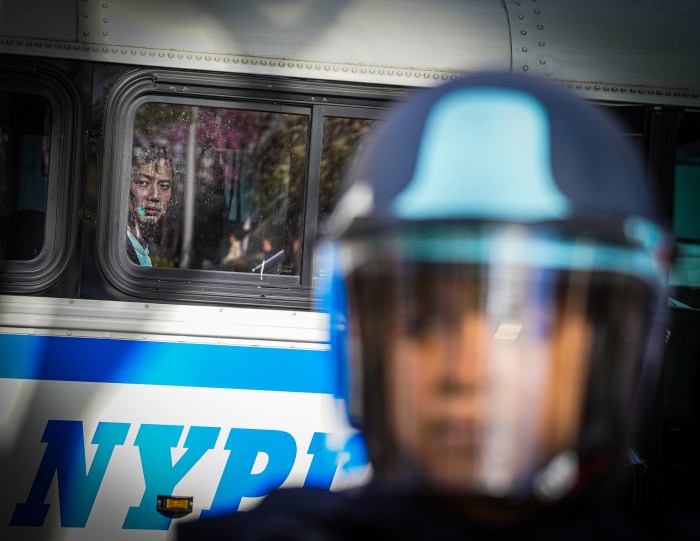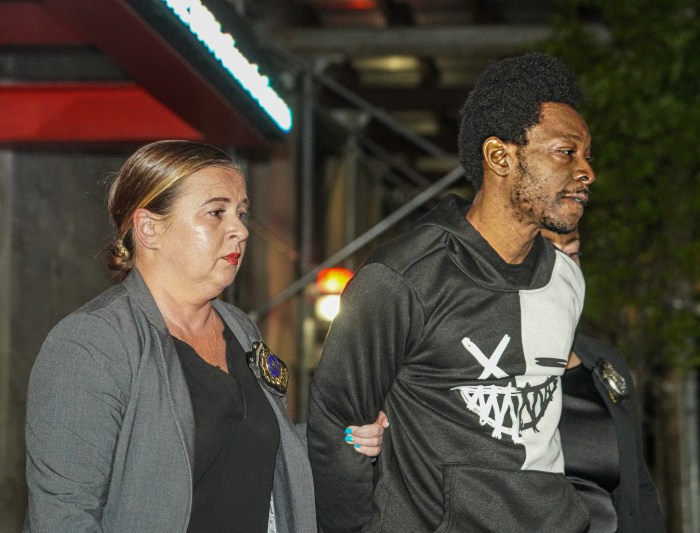By David Spett
With support from animal-rights organizations, Councilmember Rosie Mendez introduced a bill Tuesday to ban wild animal acts from the circus, a move Ringling Bros. and Barnum & Bailey said would force them to stop all of their New York City performances.
“We cannot say we’re an enlightened society when we allow animals to be tortured and abused for entertainment purposes,” Mendez said Tuesday at City Hall at a press conference organized by the League of Humane Voters of New York City, an animal-rights group.
If passed, the law would ban all wild and exotic animals — including elephants, chimpanzees, tigers and lions — from circuses, carnivals and other live performances in New York City. The law would not affect domesticated animals like cats, dogs, horses or cattle, and would also not apply to zoos.
“The public is starting to realize that wild animals don’t belong in captivity and especially not in the circus,” said Maryanne Byington, treasurer of the League of Humane Voters of New York City. “I’m certain that the City Council will be hearing from their constituents.”
Mendez said wild animals are trained cruelly, constantly confined and pose a danger to the public. She expressed particular concern over bull hooks, devices Byington said are used to pierce the skin of elephants and other wild animals as a form of punishment. A statement issued by the League of Humane Voters said, “Undercover footage of behind-the-scenes training shows elephants beaten with bull hooks and shocked with electric prods, big cats dragged by heavy chains around their neck and hit with sticks, bears whacked and prodded with long poles and chimpanzees kicked and hit with riding crops.”
Two circuses that would be affected by the legislation, Ringling Bros. and Cole Bros., said the animal-rights group’s statement was inaccurate.
“Ringling Bros. meets and exceeds all appropriate animal welfare regulations,” said Tom Albert, Ringling Bros. vice president of government relations. “Close regulation is the best way to ensure animals are properly cared for.”
Mendez and her supporters also said circus animals pose a danger to the public. They pointed to an Aug. 20, 1994, incident in Honolulu when an elephant killed its trainer in a live circus performance and escaped from the arena, running through city streets and injuring 12 people before being shot down by police officers.
A vice president from Cole Bros. Circus, which performs at Midland Beach Park in Staten Island, said federal inspections are enough to ensure proper treatment of the animals.
“Circus animals are among the most highly regulated and monitored of all performing animals,” said Renee Storey, vice president of administration at Cole Bros.
Storey added that the proposed ban is demeaning to circus workers, who, she said, work hard to treat animals fairly. “It seems to me that there is some sort of prejudice regarding circus people,” Storey said. “Some small minority perceives them to be unable to provide the same care that other people might be able to give, and that’s ridiculous.”
But the League of Humane Voters said the circuses have not complied with the federal Animal Welfare Act and have been fined by the U.S. Department of Agriculture. The League said “at least 24” elephants have died under Ringling Bros.’ care since 1992.
Councilmember Mendez pointed to several towns, including Southampton and Greenburgh in New York, that have banned wild animal performances, and she said New York City has an obligation to enact a similar ban.
“We cannot say we are a great city when other cities have passed similar legislation,” Mendez said, adding that she sees this as a civil rights issue. “I like to think of myself as a humane person who embraces civil rights.”
But Ringling Bros. said it is skeptical that the bill will pass.
“It will be seen as unnecessary and actually counterproductive towards animal care once we’ve had a chance to answer questions about our care of our animals,” said Ringling Bros. Vice President Albert.
The circus executives said performing is actually good for wild, exotic animals. Storey said a study by Professor Ted Friend of Texas A&M University has shown that “animals not only don’t suffer stress, but they actually appear to enjoy performing.” Storey also disagreed that the public is on the side of the animal-rights activists, saying elephants in particular represent “the symbol of the American circus” that the public expects to see.
Amy McWethy, a Ringling spokesperson, said the circus uses about 20 endangered Asian elephants. Ringling Bros. cares for about 35 other elephants of the same species in its Center for Elephant Conservation in Polk County, Fla.
The Big Apple Circus has not used exotic, wild animals for about the past five years, said Joel Dien, the circus’s director of communications. Big Apple Circus’s elephant trainer was retiring, its lead elephant was “of an age” to retire and the organization decided not to replace them because the animals were difficult to maintain.
“Our audiences seem happy with domestic animals: horses, dogs, birds and cats,” Dien said, adding that it is important to treat animals well but that animal rights were not the reason the circus phased out its elephants.
Byington, of the League of Humane Voters, said her organization has “worked very closely” with Mendez and helped in her election last September. Byington said her organization provided the legislation for Mendez to introduce to the City Council.

















